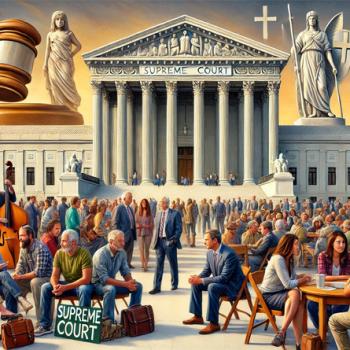From comments, toxicfur writes:
When I was a kid and my first pet (a rabbit) died, I made a comment that at least I'd be able to see poor Wiggles in heaven. My dad, a fundie and an asshole, explained that animals don't have souls — they just cease to exist, and that I'd never see the rabbit again. It seemed perfectly reasonable to him, but I was devastated. My mom — a much more reasonable person — explained that we don't really know what happens to animals, but that since heaven is perfect, then we should be able to see our loved ones, even our pets, after we die.
Growing up among the fundies, I met a few folks like toxicfur's dad — stern men who believed God was a stern man, and who seemed to enjoy gravely informing children that their dead pets were soulless, unloved by God and unwelcome in the Great Hereafter.* Presumptuous idiots, all, speaking with utter certainty based on nothing. Literally nothing — based on the absence of anything explicit in our Bible regarding God's relationship with other creatures.
I say "our Bible" because, inspired though it may be, it is a book written by and for humans and as such doesn't address questions that are, as C.S. Lewis put it, none of our business. God's relationship with the beasts is between them and God, so it's presumptuous to speak with certainty on the matter.
We do have some hints, however. Look around. Haldane's quip that God must be "inordinately fond of beetles" seems to me to be good theology. My sola-scriptura friends, of course, are suspicious of any theologizing except that from the page ("look around" is, to them, flirtation with heresy). But there are plenty of hints on the page as well.
The Book of Job, for example, tells us that God is immensely fond of, and proud of, ostriches. Just as small children can't imagine Heaven being heavenly without the presence of their beloved pets, it seems the God of Job couldn't imagine a Heaven in which there weren't ostriches running about, neglecting their eggs and generally behaving like ostriches. And it's worth mentioning that some of the imagery used to describe the blessed kingdom includes the presence of animals. See for example Isaiah 11:5-7. Toxicfur's dad is on shaky ground if he wants to argue that while that passage may mention wolves, lambs, leopards, goats, calves, lions, yearlings and bears, it doesn't specifically mention rabbits, so therefore Wiggles et. al. must be fated for annihilation.
In the same long monologue in which God praises ostriches, God also talks about Orion — a reminder that the target audience for the Book of Job, as for the rest of the Bible, is humans from Earth (the only place in the universe from which Orion looks like Orion). And just as it would be pointless to look to our earthling's Bible to discern the particulars of the relationship between God and the Rigelians (if there are any), it's also pointless to look to our human's Bible for insight into the eternal disposition of other earthly creatures for whom our Bible was not written.
We are told that in our father's house there are many mansions. We are not told, and so we cannot say, whether there are also many gardens, pastures, forests, swamps, deserts and streams. I suspect, and also hope, that there are. It seems to me both parochial and chauvinist to decide that, since God has promised us heaven, God can't have promised any such thing to anyone else — beast or bird, trilobite or pteradactyl, beetle or Betelgeusian.
The odd thing about people like toxicfur's dad is the vehemence with which they insist on excluding the animals from their vision of heaven. Here I think theologians can learn from those FBI profilers who hunt serial killers. The serial killers always start by doing things to animals, but they never stop there. They always end up doing the same things to humans.
– – – – – – – – – – – –
* I appreciate that many reasonable people of good will don't believe there is any such hereafter, or any such thing as heaven. It's easy if you try. For my part, there are many heavens, or ideas of heaven, in which I don't believe either. Included among them is the idea that heaven is completely other-worldly, that it is wholly unrelated to the here and now.
















